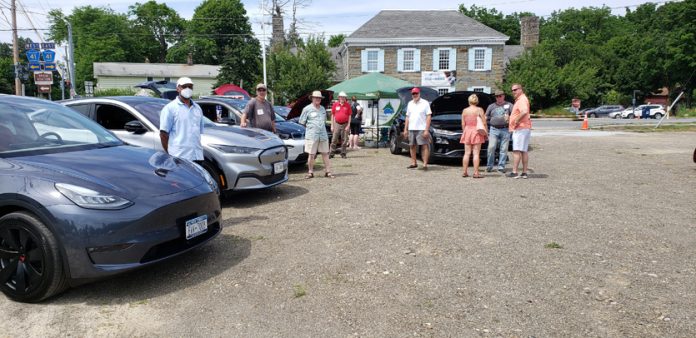HYDE PARK – “Is That Ford Mustang An Electric Vehicle?” was a common question among visitors of the Hyde Park Chamber of Commerce 12th annual car show Sunday July 17. And yes, it is a 0-60 in 4 seconds Ford Mustang electric vehicle. The BMW, Hyundai and Tesla models in the exhibit are also electric vehicles. The electric Ford F150 was on a road trip to Maine, and missed the show.
“We wanted visitors to have an opportunity to ask their questions, to hear EV owner experiences driving, charging and buying the vehicles”, says Stu Davis of the Chamber. “They are no longer a car of the future, but are in the show rooms”.
Many automobile manufacturers supply EV’s: Audi, Nissan, Porsche, Volvo,Jaguar, Mini, Mazda, Mercedes, Volkswagen, Hyundai, and Kia, and of course Tesla. Driving ranges per charge vary from 240 to over 500 miles, depending on model and configuration.
Steve Wehr, coordinator of the EV group notes “owners love to answer questions about their cars. We love to dispel the misconceptions about EV’s and let people know what great vehicles they are for most families.”
Experts conclude EV’s are as safe if not safer than internal combustion vehicles scoring higher ratings from the Insurance Institute of Highway Safety. EV’s safety features shut down the electrical system when detecting a collision. They are 60 times less likely to catch fire compared to internal combustion vehicles.Federal regulations mandate that automakers warranty batteries at least eight years / 100,000 miles. Some automakers even cover battery degradation.
Much less maintenance is required, estimated at 50% less than internal combustion vehicles: no oil, sparkplugs, and catalytic converters. The battery, motor, and electronics require little to no maintenance. There are much less fluids to maintain. Brake wear is much less, as braking is actually a process of generating power to charge the battery.
As of 2020, traditional gas vehicle average MPG was around 25.7. Average comparable MPG equivalence EVs was100 or higher or about four times as efficient as gas vehicles.
EV consumers can receive rebates, tax credits, exemptions. Most popular is the Federal Qualified PEV Tax Credit of up to $7,500. These incentives are offered at all levels of government (federal, state, local) and even by certain companies or agencies, such as utility companies and air quality management districts.
Why buy an EV? As one owner put it: cost savings, practicality and enjoyment.






